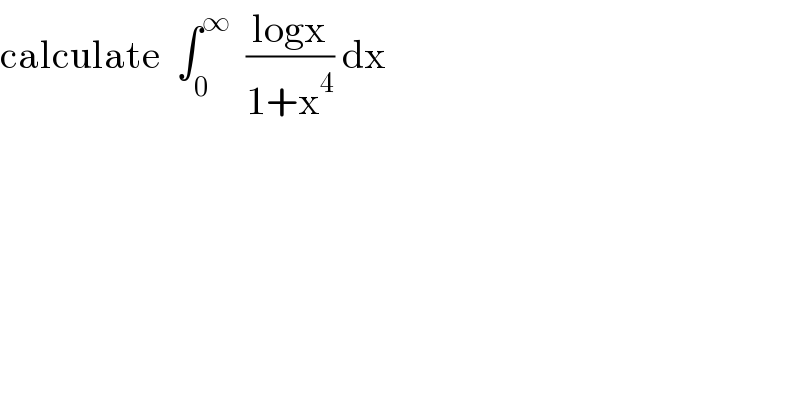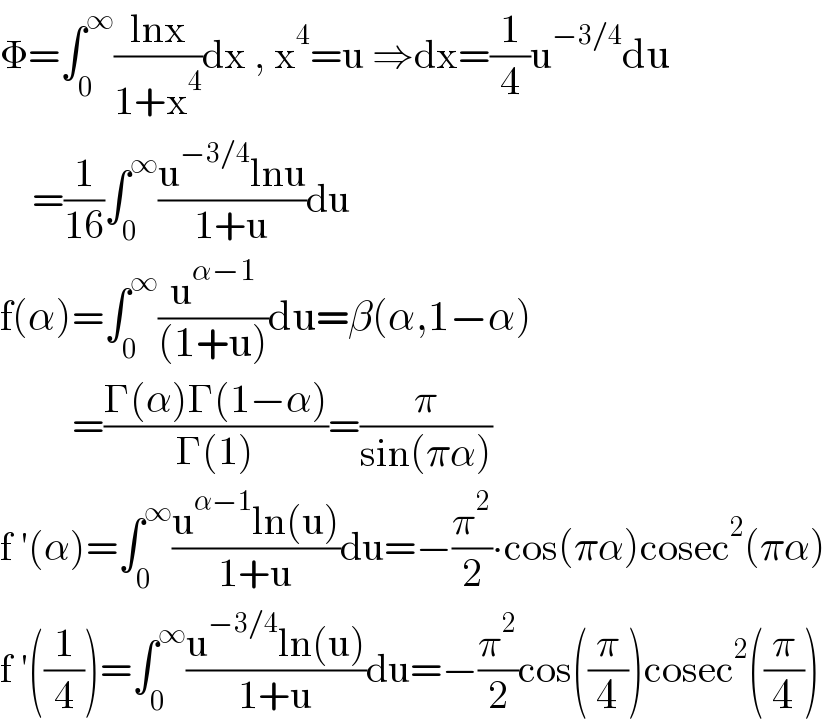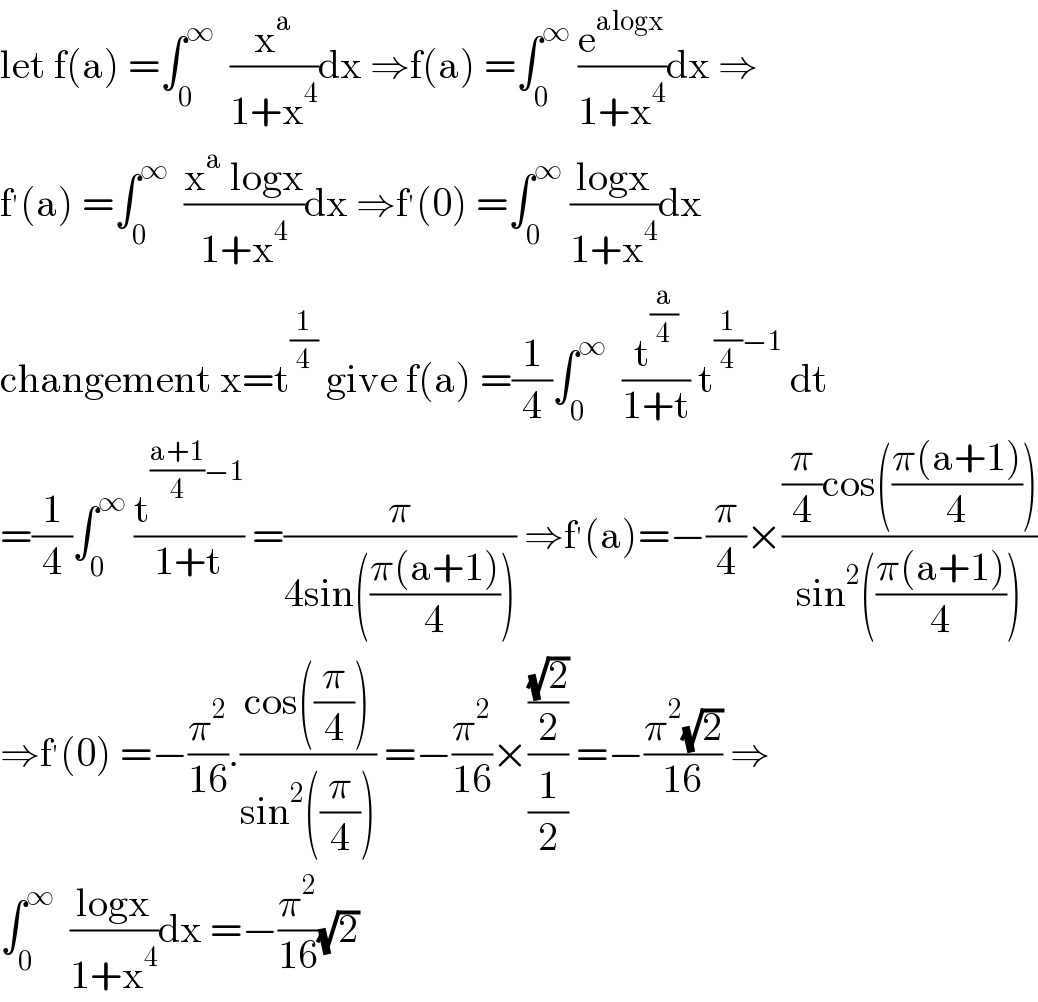Question Number 141220 by mathmax by abdo last updated on 16/May/21

$$\mathrm{calculate}\:\:\int_{\mathrm{0}} ^{\infty} \:\:\frac{\mathrm{logx}}{\mathrm{1}+\mathrm{x}^{\mathrm{4}} }\:\mathrm{dx} \\ $$
Answered by Ar Brandon last updated on 16/May/21

$$\Phi=\int_{\mathrm{0}} ^{\infty} \frac{\mathrm{lnx}}{\mathrm{1}+\mathrm{x}^{\mathrm{4}} }\mathrm{dx}\:,\:\mathrm{x}^{\mathrm{4}} =\mathrm{u}\:\Rightarrow\mathrm{dx}=\frac{\mathrm{1}}{\mathrm{4}}\mathrm{u}^{−\mathrm{3}/\mathrm{4}} \mathrm{du} \\ $$$$\:\:\:\:=\frac{\mathrm{1}}{\mathrm{16}}\int_{\mathrm{0}} ^{\infty} \frac{\mathrm{u}^{−\mathrm{3}/\mathrm{4}} \mathrm{lnu}}{\mathrm{1}+\mathrm{u}}\mathrm{du} \\ $$$$\mathrm{f}\left(\alpha\right)=\int_{\mathrm{0}} ^{\infty} \frac{\mathrm{u}^{\alpha−\mathrm{1}} }{\left(\mathrm{1}+\mathrm{u}\right)}\mathrm{du}=\beta\left(\alpha,\mathrm{1}−\alpha\right) \\ $$$$\:\:\:\:\:\:\:\:\:=\frac{\Gamma\left(\alpha\right)\Gamma\left(\mathrm{1}−\alpha\right)}{\Gamma\left(\mathrm{1}\right)}=\frac{\pi}{\mathrm{sin}\left(\pi\alpha\right)} \\ $$$$\mathrm{f}\:'\left(\alpha\right)=\int_{\mathrm{0}} ^{\infty} \frac{\mathrm{u}^{\alpha−\mathrm{1}} \mathrm{ln}\left(\mathrm{u}\right)}{\mathrm{1}+\mathrm{u}}\mathrm{du}=−\frac{\pi^{\mathrm{2}} }{\mathrm{2}}\centerdot\mathrm{cos}\left(\pi\alpha\right)\mathrm{cosec}^{\mathrm{2}} \left(\pi\alpha\right) \\ $$$$\mathrm{f}\:'\left(\frac{\mathrm{1}}{\mathrm{4}}\right)=\int_{\mathrm{0}} ^{\infty} \frac{\mathrm{u}^{−\mathrm{3}/\mathrm{4}} \mathrm{ln}\left(\mathrm{u}\right)}{\mathrm{1}+\mathrm{u}}\mathrm{du}=−\frac{\pi^{\mathrm{2}} }{\mathrm{2}}\mathrm{cos}\left(\frac{\pi}{\mathrm{4}}\right)\mathrm{cosec}^{\mathrm{2}} \left(\frac{\pi}{\mathrm{4}}\right) \\ $$
Answered by mathmax by abdo last updated on 16/May/21

$$\mathrm{let}\:\mathrm{f}\left(\mathrm{a}\right)\:=\int_{\mathrm{0}} ^{\infty} \:\:\frac{\mathrm{x}^{\mathrm{a}} }{\mathrm{1}+\mathrm{x}^{\mathrm{4}} }\mathrm{dx}\:\Rightarrow\mathrm{f}\left(\mathrm{a}\right)\:=\int_{\mathrm{0}} ^{\infty} \:\frac{\mathrm{e}^{\mathrm{alogx}} }{\mathrm{1}+\mathrm{x}^{\mathrm{4}} }\mathrm{dx}\:\Rightarrow \\ $$$$\mathrm{f}^{'} \left(\mathrm{a}\right)\:=\int_{\mathrm{0}} ^{\infty} \:\:\frac{\mathrm{x}^{\mathrm{a}} \:\mathrm{logx}}{\mathrm{1}+\mathrm{x}^{\mathrm{4}} }\mathrm{dx}\:\Rightarrow\mathrm{f}^{'} \left(\mathrm{0}\right)\:=\int_{\mathrm{0}} ^{\infty} \:\frac{\mathrm{logx}}{\mathrm{1}+\mathrm{x}^{\mathrm{4}} }\mathrm{dx} \\ $$$$\mathrm{changement}\:\mathrm{x}=\mathrm{t}^{\frac{\mathrm{1}}{\mathrm{4}}} \:\mathrm{give}\:\mathrm{f}\left(\mathrm{a}\right)\:=\frac{\mathrm{1}}{\mathrm{4}}\int_{\mathrm{0}} ^{\infty} \:\:\frac{\mathrm{t}^{\frac{\mathrm{a}}{\mathrm{4}}} }{\mathrm{1}+\mathrm{t}}\:\mathrm{t}^{\frac{\mathrm{1}}{\mathrm{4}}−\mathrm{1}} \:\mathrm{dt} \\ $$$$=\frac{\mathrm{1}}{\mathrm{4}}\int_{\mathrm{0}} ^{\infty} \:\frac{\mathrm{t}^{\frac{\mathrm{a}+\mathrm{1}}{\mathrm{4}}−\mathrm{1}} }{\mathrm{1}+\mathrm{t}}\:=\frac{\pi}{\mathrm{4sin}\left(\frac{\pi\left(\mathrm{a}+\mathrm{1}\right)}{\mathrm{4}}\right)}\:\Rightarrow\mathrm{f}^{'} \left(\mathrm{a}\right)=−\frac{\pi}{\mathrm{4}}×\frac{\frac{\pi}{\mathrm{4}}\mathrm{cos}\left(\frac{\pi\left(\mathrm{a}+\mathrm{1}\right)}{\mathrm{4}}\right)}{\mathrm{sin}^{\mathrm{2}} \left(\frac{\pi\left(\mathrm{a}+\mathrm{1}\right)}{\mathrm{4}}\right)} \\ $$$$\Rightarrow\mathrm{f}^{'} \left(\mathrm{0}\right)\:=−\frac{\pi^{\mathrm{2}} }{\mathrm{16}}.\frac{\mathrm{cos}\left(\frac{\pi}{\mathrm{4}}\right)}{\mathrm{sin}^{\mathrm{2}} \left(\frac{\pi}{\mathrm{4}}\right)}\:=−\frac{\pi^{\mathrm{2}} }{\mathrm{16}}×\frac{\frac{\sqrt{\mathrm{2}}}{\mathrm{2}}}{\frac{\mathrm{1}}{\mathrm{2}}}\:=−\frac{\pi^{\mathrm{2}} \sqrt{\mathrm{2}}}{\mathrm{16}}\:\Rightarrow \\ $$$$\int_{\mathrm{0}} ^{\infty} \:\:\frac{\mathrm{logx}}{\mathrm{1}+\mathrm{x}^{\mathrm{4}} }\mathrm{dx}\:=−\frac{\pi^{\mathrm{2}} }{\mathrm{16}}\sqrt{\mathrm{2}} \\ $$
